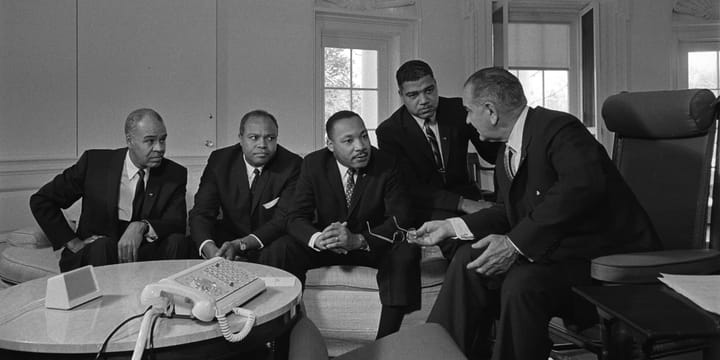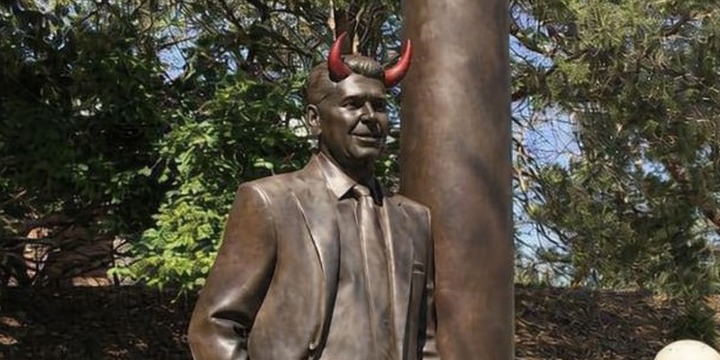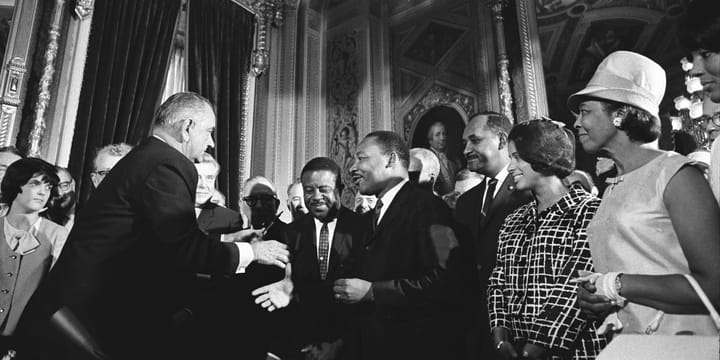An assault on civil rights 60 years in the making
Sixty years after its groundbreaking passage, the Voting Rights Act faces its gravest threats yet. It has evolved into a legal battlefield where the very foundations of American democracy are being contested.

George Chidi writes in The Guardian about the renewed assault on civil rights: "The Voting Rights Act Under Siege: 60 Years Later, Democracy Hangs in the Balance." A summary and additional commentary follows.
It started in Selma
The Voting Rights Act of 1965 emerged from brutal images that shocked America. As 600 demonstrators crossed the Edmund Pettus Bridge, police met them with truncheons and teargas. Future Congressman John Lewis was beaten unconscious on live television. (Full disclosure: he was my congressman for almost 30 years.) National outrage force Congress to the political will to act.
The law aimed to end the discriminatory "whack-a-mole" games local officials played with voting rights. States had developed creative ways to disenfranchise Black voters—literacy tests, poll taxes, separate ballot boxes, white-only primaries, and discriminatory redistricting. Some of this should start to sound familiar to our modern ears.
The Act's solution provided an elegant, simple solution. It forced jurisdictions with histories of discrimination to receive federal approval before changing election rules.
Erosion of the act by the courts
The law was reauthorized four times under Republican presidents. But now, the law has beegun to be systematically dismantled by Republican led courts. With Shelby County v. Holder in 2013, the Supreme Court dealt a devastating blow to what had been the uncontested law of the land.
The Court ruled that data identifying discriminatory jurisdictions was outdated, and that Congress needed to update the formula. But Republican have repeatedly blocked the primary effort to do so, the John Lewis Voting Rights Advancement Act.
States previously restricted by federal oversight immediately began to play fast and loose with voting. They employed tactics such as:
- Closing polling places
- Changing polling place locations
- Changing voter registration rules
- Purging vote rolls without justification
- Redrawing precinct lines without review
- Requiring IDs to vote (a de facto poll tax)
I've witnessed most of these tactics in Georgia, and they have been focused on minority (i.e., solidly Democratic) voters and areas.
How it looks in the real world today
The article focuses on the hijinks occurring in Texas, of course. The state's Republican-led, off-cycle redistricting that could grant the GOP five additional congressional seats. So this is playing out in real time. The proposed maps would concentrate minority voters into fewer districts while diluting others—exactly what the Voting Rights Act was designed to prevent.
Democratic legislators have fled the state to deny the legislature the quorum needed to pass this. Despite the huffing and puffing by the Republicans, this is a Texas tradition dating back to 1970.
Under the old system, these maps would have required federal pre-approval. Now they can only be challenged after implementation—a much weaker, time-consuming process that would likely be dismissed or blocked by Republicans on the courts.
The assault extends beyond redistricting. Federal courts have limited who can bring voting rights cases. The Eighth Circuit ruled that only the Department of Justice—not private groups—can challenge election laws under the Act. Such challenges are unlikely in a republican administration—they hated this act since the beginning.
The coming death blow
The Supreme Court will likely deliver the final blow to the act. In Louisiana v. Callais, the Court will consider whether requiring majority-minority districts violates the Constitution's Equal Protection Clause. This attempts to put the Voting Rights Act against the Constitution itself.
If (ahem, when) this succeeds, it would create grounds for white voters to challenge any law protecting minority voting rights, turning decades of civil rights law on its head. The racist rail on top yet again.
Democracy itself is at stake
Todd Cox of the NAACP Legal Defense Fund states it plainly:
The systematic dismantling of voting rights protections comes amid unprecedented political polarization and declining faith in democratic institutions. The death of the Voting Rights act will only accelerate the latter trend among a significant portion of non-white voters.
But the current regime cares nothing about them. Only their white based matters, and they've moved beyond mere dog whistles.
Ironically, the success of the act (progress in voter engagement among communities of color) has triggered a backlash designed to cause its demise. "This is a cyclical part of history," Cox observes. "When we see success in advancing rights, there's always backlash."
As the Voting Rights Act enters its seventh decade, America faces a critical question: will the law that once transformed a nation survive to protect future generations, or will equal representation become another casualty in the struggle for democracy?
The stakes couldn't be higher, and the outcome will determine whether America lives up to its democratic ideals or retreats into the shadows of its discriminatory past.
So what can be done? This first step is Democratic success in blocking the Texas redistricting. If that fails, California, Illinois, New York, and other democratic should respond in kind, together.
Finally, the John Lewis Voting Rights Advancement Act must be passed as soon as Democrats have the majorities required.
Non in cautus futuri.



